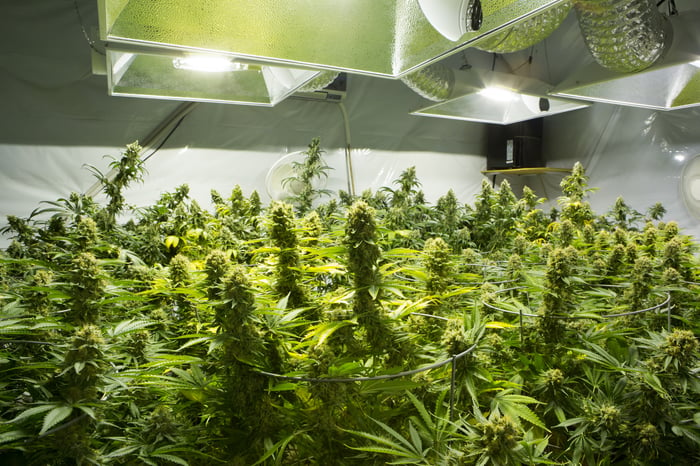The "canna-business" is booming, in case you haven't noticed. After generating a whopping $10.9 billion in legal sales last year in licensed stores, the newest "State of the Legal Cannabis Markets" report from the duo of Arcview Market Research and BDS Analytics projects that worldwide sales will top $40 billion by 2024, which is good enough for a more than 24% compound annual growth rate.
Interestingly enough, though, this rapid growth rate hasn't exactly led to pot stocks seeing green. There are just a small handful of cannabis stocks currently profitable on an operating basis, without the aid of fair-value adjustments and one-time benefits. Also interesting is the fact that what few profitable marijuana stocks do exist are located in, or focused on, the United States.
That raises the question: What Canadian pot stock will be the first to deliver profits on a recurring basis without the need for one-time benefits?

Image source: Getty Images.
It won't be these four popular pot stocks
Perhaps the easiest thing to do is remove the Canadian marijuana growers that we absolutely know won't be the answer, such as Canopy Growth (CGC 1.28%), Aurora Cannabis (ACB -1.15%), Cronos Group (CRON -1.66%), and Tilray (TLRY).
Both Canopy Growth and Aurora Cannabis have been clear that their intentions are to lay the infrastructure for North American and global expansion. This means plenty of acquisitions and an abundance of spending to handle all aspects of branding, portfolio diversification, and international expansion. After reporting a loss of 670 million Canadian dollars in fiscal 2019, Canopy Growth's chances at profitability in 2020 are pretty slim. Likewise, Aurora Cannabis' chances of generating recurring profits continue to shrink with each costly acquisition, and given Canada's near-term supply issues.
As for Cronos Group and Tilray, a lack of production and/or a meandering strategy will likely keep both companies running in the red. Although Cronos Group is focusing on substantially higher margin derivatives production, it's going to take some time for the company to ramp up global production. That means losses are likely in the near term.
Meanwhile, Tilray's strategy completely shifted in mid-March, according to CEO Brendan Kennedy. Having been forced to purchase wholesale cannabis to make good on its supply agreements, thereby crushing its own margins, it'll be about a year before Tilray's focus on the U.S. and Europe gives it any chance at recurring profitability.

Image source: Getty Images.
The Canadian cannabis stock with the best chance at recurring profitability is...
Although costs are likely to be high for all growers over the next couple of quarters as they look to diversify their production and combat supply chain issues that'll likely take many quarters to resolve in Canada, the most likely of all major marijuana growers in Canada to be profitable on a recurring basis is.... OrganiGram Holdings (OGI 1.07%).
OrganiGram has a number of factors working in its favor that give it a leg up on its competition in terms of reaching recurring profitability first.
To begin with, unlike many of its peers, OrganIGram is working on just a single grow facility. Compare that to Canopy Growth or Aurora Cannabis, which have a respective 10 and 15 grow farms in their portfolios. By focusing on a single campus in Moncton, New Brunswick, OrganiGram is able to minimize its shipping and transportation costs, which can add up over time, as well as keep its labor costs reasonably low.
OrganiGram is also able to keep expenses down within its Moncton campus. When grow-room construction is complete by the end of the year, the company will be capable of 113,000 kilos of annual run-rate production, but will only be devoting about 490,000 square feet of space to yield this output. That's better than 230 grams per square foot, which looks to be more than double the industry average at peak capacity. OrganiGram is achieving such figures by utilizing three growing tiers in its cultivation rooms, thereby maximizing its licensed space.

Image source: Getty Images.
Perhaps it's also worth noting at this point that OrganiGram is one of four weed growers that has signed a supply deal with all of Canada's provinces, along with Canopy Growth, Aphria, and CannTrust Holdings. Even though it's unclear just how much marijuana OrganiGram is providing to these provinces, these supply deals are, nevertheless, an important means of generating guaranteed quarterly cash flow.
Last, but not least, OrganiGram plans to focus on high-margin derivative products, like many of its peers. A recently announced phase 5 expansion at Moncton will feature added extraction capacity, which adds onto the company's multiyear agreement with Valens GroWorks, which allows Valens to supply OrganiGram with distillates and cannabinoids for derivative production.
Obviously, there are no guarantees here that OrganiGram will beat its peers to recurring profitability given the nature of the industry and its rapidly changing variables. However, OrganiGram looks to have the low-cost structure and high-yield production capable of one-upping its much larger competitors and reaching recurring profitability before any other Canadian pot stock.





